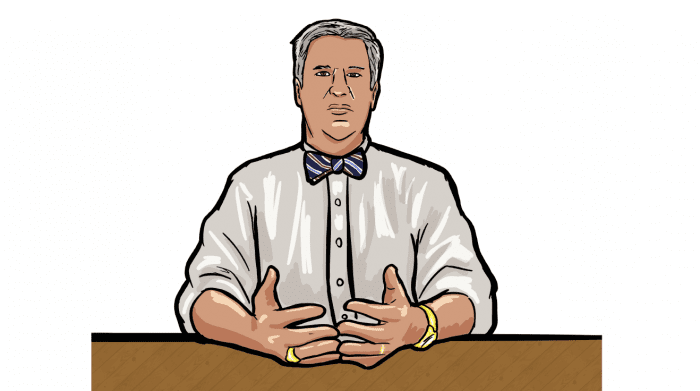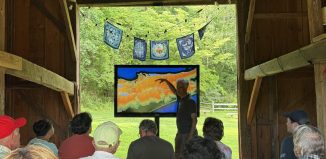One-on-one with Bob Juliano: Former Port Jeff village clerk pursues trustee seat

What would be your top priority for the coming term, if elected?
It’s more like a top couple of priorities.
I’d like to see the Building Department be a full complement as far as the planning and enforcement sides. Right now, I know the building department is in the process of interviewing planners. Hiring in the village is tough because you have to go through civil service — you have to exhaust the civil service list before you go outside. It becomes a long, laborious project to interview and hire somebody.
Entering the busy season in the village, as far as tourists, the Code Enforcement office is a little in flux with not having a chief. I’d like to see that stabilized, going ahead and ensuring that the village is a safe place for everyone.
I’d like to see trustee [Stan] Loucks’ plan for the country club implemented. There’s water there that we should be capturing. It just makes economic and ecological sense to put his plan in and create another pond.
Environmentally, Port Jefferson was called Drowned Meadow for a reason. It always flooded out, so we have to work environmentally to do something to either alleviate or lessen the flooding in the downtown area. Especially going forward, I think flooding will be more and more of an issue downtown.
If elected, how do you intend to help guide East Beach bluff stabilization efforts and maximize the use of the village-owned Port Jefferson Country Club?
The country club is a very important piece of property that the village owns.
The country club is a dedicated parkland, so it’s there to stay. It’s there, and we have to protect it. [The Board of Trustees] started the [lower] part of the wall, which I think should have gone out to public referendum, but that’s water under the bridge — no pun intended.
I think what they have to do is to continue the wall. They have to build the second portion upland. I like the idea that they’re getting federal funds and help to stabilize the bluff and build the second part of the wall. That should stabilize it, but for how long, I don’t know.
I’m not a golfer myself, but I know it does help property values just by the village owning a golf course and having village residents able to join the country club to play golf.
I’d like to see it expanded a little. I know with the bluff issue, they had to close down the tennis [program], and I’d like to see the tennis courts come back for the tennis players to come back and play. I just started to play pickleball, so I’d like to see some pickleball courts put in there, too.
But I think it’s a valuable asset that the village has to protect.
What is the role of the village board in overseeing new developments and redevelopment projects?
The village board can lead and tell the Planning Board how we want the village to go.
There are two current issues that are going on. There’s the second half of the [uptown] Conifer Project, which I believe has already been approved and starting construction shortly. That’s going to be an asset to the uptown area as a whole. I’m hoping they have [commercial] tenants ready to enter the lower portion. Then they can start renting out the upper portion.
As far as Maryhaven, I’d like to see that thought out fully before they go and say, “Yes, you can do the condos.” I know as much as everybody else — I don’t have any inside information — and what was said at the [May 1] public meeting.
Everything has to be looked at there. Could the village use that property? It’s a perfect piece of property up the hill for the Fire Department, the Building Department and Village Hall. That would be perfect with everything right on the campus there.
That will cost money, so whether that’s feasible or not and whether there’s money out there is a question. But it has to be looked at and investigated before everything’s a done deal.
As far as future developments, I have an idea. I’ve seen it done in Westbury. A lot of times, the IDA will come in, the Industrial Development Agency will go in, and they’ll meet with the developer and say, “We’re going to give you rebates or tax relief.” And the village has no say.
In Westbury, I’ve seen it done where the property in question has to pay at least the taxes they’re paying now. So they don’t go back down to zero but start with the taxes they’re paying now. The village won’t lose any money, and then it builds up from there as the building gets built and the assessment changes.
How can the village alleviate its parking capacity challenges, balancing the competing interests of residents, businesses and tourists?
Parking in the village is very interesting. If you look back at the village’s history, one of the reasons it was incorporated was because of parking.
There’s very limited land in the commercial district to add parking. I can foresee some sort of parking — a level or two — being added to the area. “Where?” is the question.
If you put a parking structure in the uptown, you have to worry about getting people from the uptown area to downtown. How do we deal with that?
We have a parking administrator. I’d like to see maybe the parking committee come back into being and resurrect the parking committee to get more ideas — ideas from businesspeople and residents.
I think, eventually, the only way to do it is to put up some sort of parking structure. That’s going to have to be built. That leads to other challenges that we’ll have to overcome.
What is your preferred method for public engagement?
My plan is that once a month, I’ll be at the Village Center — in the living room area there — and as a very casual thing, I’ll sit there for anybody who wants to come by and talk to me. I’ll have set hours, and then I can bring those concerns and issues back to the village board.
I’d also like to see some sort of portal added to the village website. People can either volunteer or see what volunteer opportunities there are for various committees. It’s a way to open up to the rest of the village.
What is your professional background, and how does it apply to the role of a trustee?
I’m a graduate of St. John’s University. I graduated with an undergraduate degree in government and politics and public administration. I have an MBA, also from St. John’s, in economics.
Right out of college, I started working for two different banks for 10 years. Then I became a treasurer of the Village of Lindenhurst. I was treasurer for eight years. I had a brief stint working for News 12 and was moving to Port Jeff when a friend of mine said the [then] clerk was leaving Port Jeff and that I should drop my resume off to the mayor.
I did that and was interviewed by the first Mayor Garant [Jeanne]. She hired me, and I was the clerk of Port Jefferson for 18 years. Then I retired from Port Jeff and went to the Village of Westbury, where I grew up. I was clerk-treasurer of Westbury for two years.
When I was in college, my grandfather was the mayor of Westbury. He was a trustee for many years, so I got my introduction to local and municipal politics through the family.
Note to our readers
We intend to interview each of the declared candidates for village office, starting with those running for trustee, then mayor. In keeping with past practice, we first interview incumbents seeking reelection, followed by nonincumbents, selected alphabetically.






